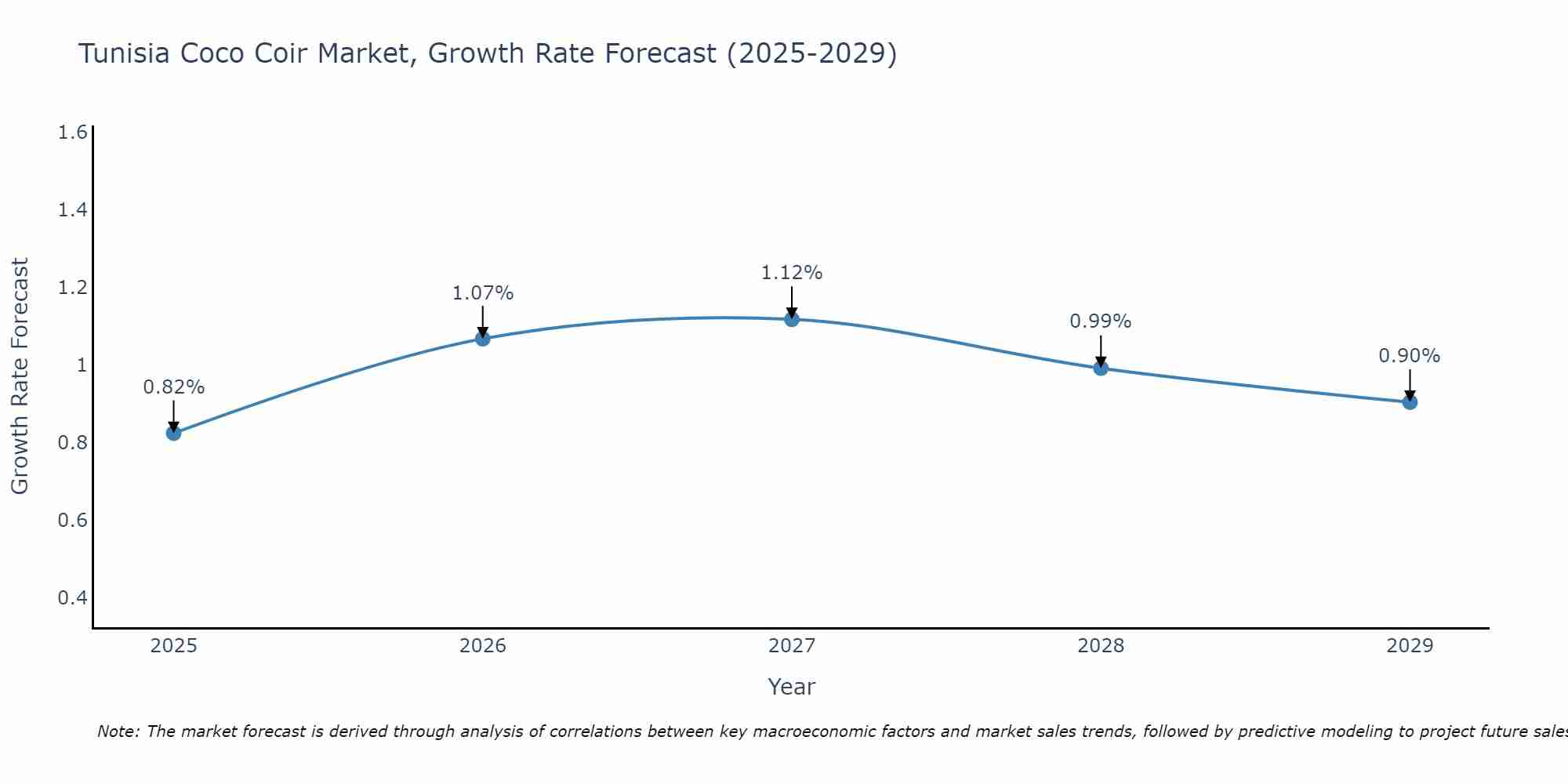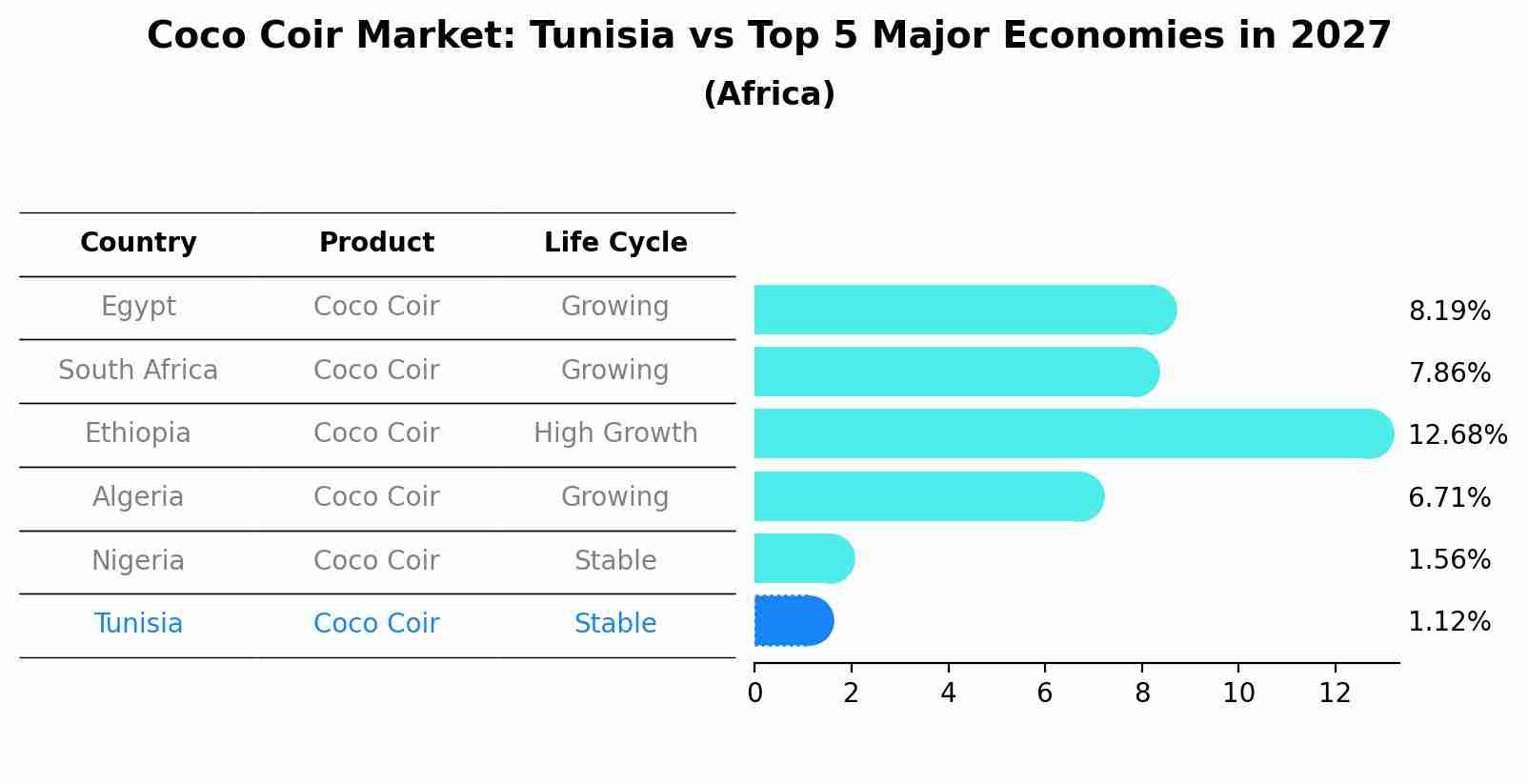Tunisia Coco Coir Market (2025-2031) Outlook | Size, Forecast, Share, Analysis, Value, Revenue, Growth, Companies, Trends & Industry
| Product Code: ETC373734 | Publication Date: Aug 2022 | Updated Date: Jul 2025 | Product Type: Market Research Report | |
| Publisher: 6Wresearch | Author: Shubham Padhi | No. of Pages: 75 | No. of Figures: 35 | No. of Tables: 20 |
Tunisia Coco Coir Market Size Growth Rate
The Tunisia Coco Coir Market is projected to witness mixed growth rate patterns during 2025 to 2029. Starting at 0.82% in 2025, the market peaks at 1.12% in 2027, and settles at 0.90% by 2029.

Coco Coir Market: Tunisia vs Top 5 Major Economies in 2027 (Africa)
The Coco Coir market in Tunisia is projected to grow at a stable growth rate of 1.12% by 2027, highlighting the country's increasing focus on advanced technologies within the Africa region, where Egypt holds the dominant position, followed closely by South Africa, Ethiopia, Algeria and Nigeria, shaping overall regional demand.

Tunisia Coco Coir Market Synopsis
The Tunisia Coco Coir Market is experiencing steady growth due to the increasing demand for eco-friendly and sustainable growing mediums in the agriculture and horticulture sectors. Coco coir, derived from coconut husks, is valued for its excellent water retention and aeration properties, making it ideal for plant cultivation. The market is driven by a rising trend towards organic farming practices and the need for alternatives to traditional peat moss. Major players in the Tunisia Coco Coir Market include suppliers, manufacturers, and distributors catering to a diverse customer base ranging from small-scale farmers to commercial agricultural enterprises. With a focus on product innovation and quality standards, the market is poised for further expansion as awareness of the benefits of coco coir continues to grow among consumers and industry professionals.
Tunisia Coco Coir Market Trends
The Tunisia Coco Coir market is experiencing growth due to increasing awareness about sustainable and eco-friendly alternatives to traditional soil amendments. The demand for coco coir is rising in the agriculture and horticulture sectors as it is a renewable resource with excellent water retention properties and aeration for plant roots. Additionally, the trend towards organic farming practices is driving the adoption of coco coir as a soil amendment to enhance crop yields and quality. Manufacturers in Tunisia are focusing on product innovation and expanding their production capacities to meet the growing market demand. The market is also witnessing a shift towards value-added coco coir products such as coco peat, coco chips, and coco fibers to cater to diverse consumer needs and applications.
Tunisia Coco Coir Market Challenges
In the Tunisia Coco Coir market, challenges include limited awareness and education among farmers about the benefits of using coco coir as a growing medium, resulting in slow adoption rates. Additionally, the lack of standardized quality control measures and inconsistent product quality from different suppliers can hinder trust and confidence in the market. Limited availability of locally sourced coco coir and high transportation costs for imported products also impact the competitiveness of coco coir compared to traditional growing mediums. Furthermore, the emergence of alternative growing substrates and competition from other soilless mediums pose challenges for market growth. Overcoming these obstacles will require targeted educational campaigns, improved quality control processes, strategic partnerships with suppliers, and efforts to lower production costs to make coco coir more accessible and attractive to Tunisian farmers.
Tunisia Coco Coir Market Investment Opportunities
The Tunisia Coco Coir Market presents promising investment opportunities due to the increasing demand for organic and sustainable growing mediums in the agriculture and horticulture sectors. Coco coir, a byproduct of coconut husks, is valued for its water retention, aeration, and nutrient retention properties, making it an ideal choice for soilless cultivation. Investors can consider opportunities in coco coir production facilities, distribution networks, and value-added products such as coco peat and coir pots. With Tunisia`s strategic location for export to European markets and a growing trend towards organic farming practices globally, investing in the Tunisia Coco Coir Market offers potential for growth and profitability in the agriculture industry.
Jordan Agar Market Government Policies
The Tunisian government has implemented various policies to support the Coco Coir market in the country. These policies include providing financial incentives and subsidies to Coco Coir producers, promoting sustainable farming practices, and investing in research and development to enhance the quality and productivity of Coco Coir products. Additionally, the government has introduced regulations to ensure the environmental sustainability of Coco Coir production, such as monitoring water usage and waste management practices. These policies aim to boost the competitiveness of the Tunisian Coco Coir market, attract investments, create employment opportunities, and contribute to the country`s economic growth while promoting eco-friendly practices in the agricultural sector.
Tunisia Coco Coir Market Future Outlook
The future outlook for the Tunisia Coco Coir Market appears promising due to growing awareness of sustainable agricultural practices and the increasing demand for organic products. With coco coir being a versatile and environmentally friendly substrate that improves soil structure and water retention, its usage is expected to rise in various applications such as greenhouse cultivation, hydroponic systems, and landscaping. Additionally, the government`s efforts to promote agriculture and support local farmers are likely to further drive the market growth. As the trend towards organic farming continues to strengthen globally, Tunisia`s coco coir market is well-positioned to capitalize on these opportunities and expand in the coming years.
Key Highlights of the Report:
- Tunisia Coco Coir Market Outlook
- Market Size of Tunisia Coco Coir Market, 2024
- Forecast of Tunisia Coco Coir Market, 2031
- Historical Data and Forecast of Tunisia Coco Coir Revenues & Volume for the Period 2021 - 2031
- Tunisia Coco Coir Market Trend Evolution
- Tunisia Coco Coir Market Drivers and Challenges
- Tunisia Coco Coir Price Trends
- Tunisia Coco Coir Porter's Five Forces
- Tunisia Coco Coir Industry Life Cycle
- Historical Data and Forecast of Tunisia Coco Coir Market Revenues & Volume By Product for the Period 2021 - 2031
- Historical Data and Forecast of Tunisia Coco Coir Market Revenues & Volume By Coco Coir Grow Bags for the Period 2021 - 2031
- Historical Data and Forecast of Tunisia Coco Coir Market Revenues & Volume By Bales for the Period 2021 - 2031
- Historical Data and Forecast of Tunisia Coco Coir Market Revenues & Volume By Coir Material for the Period 2021 - 2031
- Historical Data and Forecast of Tunisia Coco Coir Market Revenues & Volume By Open Tops for the Period 2021 - 2031
- Historical Data and Forecast of Tunisia Coco Coir Market Revenues & Volume By Blends & Loose Substrate for the Period 2021 - 2031
- Historical Data and Forecast of Tunisia Coco Coir Market Revenues & Volume By Others for the Period 2021 - 2031
- Historical Data and Forecast of Tunisia Coco Coir Market Revenues & Volume By Application for the Period 2021 - 2031
- Historical Data and Forecast of Tunisia Coco Coir Market Revenues & Volume By Rope & Cordage for the Period 2021 - 2031
- Historical Data and Forecast of Tunisia Coco Coir Market Revenues & Volume By Coco Nets & Twines for the Period 2021 - 2031
- Historical Data and Forecast of Tunisia Coco Coir Market Revenues & Volume By Stitched Mats for the Period 2021 - 2031
- Historical Data and Forecast of Tunisia Coco Coir Market Revenues & Volume By Coconut Meals for the Period 2021 - 2031
- Historical Data and Forecast of Tunisia Coco Coir Market Revenues & Volume By Husk for the Period 2021 - 2031
- Historical Data and Forecast of Tunisia Coco Coir Market Revenues & Volume By Others for the Period 2021 - 2031
- Historical Data and Forecast of Tunisia Coco Coir Market Revenues & Volume By Consumer for the Period 2021 - 2031
- Historical Data and Forecast of Tunisia Coco Coir Market Revenues & Volume By Green Houses for the Period 2021 - 2031
- Historical Data and Forecast of Tunisia Coco Coir Market Revenues & Volume By Sellers for the Period 2021 - 2031
- Tunisia Coco Coir Import Export Trade Statistics
- Market Opportunity Assessment By Product
- Market Opportunity Assessment By Application
- Market Opportunity Assessment By Consumer
- Tunisia Coco Coir Top Companies Market Share
- Tunisia Coco Coir Competitive Benchmarking By Technical and Operational Parameters
- Tunisia Coco Coir Company Profiles
- Tunisia Coco Coir Key Strategic Recommendations
Frequently Asked Questions About the Market Study (FAQs):
- Single User License$ 1,995
- Department License$ 2,400
- Site License$ 3,120
- Global License$ 3,795
Search
Related Reports
- Saudi Arabia Manlift Market (2025-2031) | Outlook, Size, Growth, Trends, Companies, Industry, Revenue, Value, Share, Forecast & Analysis
- Uganda Excavator, Crane, and Wheel Loaders Market (2025-2031) | Strategy, Consumer Insights, Analysis, Investment Trends, Opportunities, Growth, Size, Share, Industry, Revenue, Segments, Value, Segmentation, Supply, Forecast, Restraints, Outlook, Competition, Drivers, Trends, Demand, Pricing Analysis, Competitive, Strategic Insights, Companies, Challenges
- Rwanda Excavator, Crane, and Wheel Loaders Market (2025-2031) | Strategy, Consumer Insights, Analysis, Investment Trends, Opportunities, Growth, Size, Share, Industry, Revenue, Segments, Value, Segmentation, Supply, Forecast, Restraints, Outlook, Competition, Drivers, Trends, Demand, Pricing Analysis, Competitive, Strategic Insights, Companies, Challenges
- Kenya Excavator, Crane, and Wheel Loaders Market (2025-2031) | Strategy, Consumer Insights, Analysis, Investment Trends, Opportunities, Growth, Size, Share, Industry, Revenue, Segments, Value, Segmentation, Supply, Forecast, Restraints, Outlook, Competition, Drivers, Trends, Demand, Pricing Analysis, Competitive, Strategic Insights, Companies, Challenges
- Angola Excavator, Crane, and Wheel Loaders Market (2025-2031) | Strategy, Consumer Insights, Analysis, Investment Trends, Opportunities, Growth, Size, Share, Industry, Revenue, Segments, Value, Segmentation, Supply, Forecast, Restraints, Outlook, Competition, Drivers, Trends, Demand, Pricing Analysis, Competitive, Strategic Insights, Companies, Challenges
- Israel Intelligent Transport System Market (2025-2031) | Strategy, Consumer Insights, Analysis, Investment Trends, Opportunities, Growth, Size, Share, Industry, Revenue, Segments, Value, Segmentation, Supply, Forecast, Restraints, Outlook, Competition, Drivers, Trends, Demand, Pricing Analysis, Competitive, Strategic Insights, Companies, Challenges
- Uganda Precast and Aggregate Market (2025-2031) | Strategy, Consumer Insights, Analysis, Investment Trends, Opportunities, Growth, Size, Share, Industry, Revenue, Segments, Value, Segmentation, Supply, Forecast, Restraints, Outlook, Competition, Drivers, Trends, Demand, Pricing Analysis, Competitive, Strategic Insights, Companies, Challenges
- Australia IT Asset Disposal Market (2025-2031) | Strategy, Consumer Insights, Analysis, Investment Trends, Opportunities, Growth, Size, Share, Industry, Revenue, Segments, Value, Segmentation, Supply, Forecast, Restraints, Outlook, Competition, Drivers, Trends, Demand, Pricing Analysis, Competitive, Strategic Insights, Companies, Challenges
- UAE Building Thermal Insulation Market Outlook (2025-2031) | Revenue, Companies, Share, Trends, Growth, Size, Forecast, Industry, Analysis & Value
- Portugal Electronic Document Management Market (2025-2031) | Strategy, Consumer Insights, Analysis, Investment Trends, Opportunities, Growth, Size, Share, Industry, Revenue, Segments, Value, Segmentation, Supply, Forecast, Restraints, Outlook, Competition, Drivers, Trends, Demand, Pricing Analysis, Competitive, Strategic Insights, Companies, Challenges
Industry Events and Analyst Meet
Our Clients
Whitepaper
- Middle East & Africa Commercial Security Market Click here to view more.
- Middle East & Africa Fire Safety Systems & Equipment Market Click here to view more.
- GCC Drone Market Click here to view more.
- Middle East Lighting Fixture Market Click here to view more.
- GCC Physical & Perimeter Security Market Click here to view more.
6WResearch In News
- Doha a strategic location for EV manufacturing hub: IPA Qatar
- Demand for luxury TVs surging in the GCC, says Samsung
- Empowering Growth: The Thriving Journey of Bangladesh’s Cable Industry
- Demand for luxury TVs surging in the GCC, says Samsung
- Video call with a traditional healer? Once unthinkable, it’s now common in South Africa
- Intelligent Buildings To Smooth GCC’s Path To Net Zero













